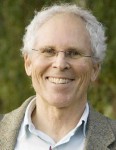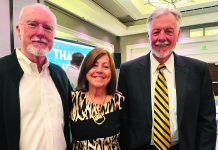Climate Change: Act Locally, the Clock is Ticking

Recently, I was one of three panelists addressing what I and many others regard as the defining issue of our time: a warming planet approaching the tipping point. Beyond it, the most ravaging consequences of global warming will be unavoidable. Massive human migrations, wars over diminishing food stocks, a poisonous ocean, species die-offs, disease vectors run amok—that’s where we’re headed.
I was joined by two scientists: Dr. Allan Schoenherr and Dr. Geoff Shester. Shester, who lives in Monterey, heads the California branch of Oceana. His participation was made possible by the generosity of Greg and Barbara MacGillivray. The occasion for the panel presentations was the annual meeting of the Laguna Greenbelt, held at the Neighborhood Congregational Church. Councilwoman Toni Iseman emceed
Shester alerted the audience to the toll that global warming is taking on oceans, coastal waters, and marine habitat. That toll includes acidification, kelp that cannot withstand 80-degree Fahrenheit ocean temperatures, and imperiled reefs. Schoenherr covered the consequences of global warming for terrestrial creatures and habitats. I laid out actions that City Hall and residents could and should take in the 12 years that the Intergovernmental Panel on Climate Change scientists say we may have to do to reduce dramatically carbon emissions to keep planetary warming below 1.5 degrees Centigrade (2.7 degrees Fahrenheit). Beyond that threshold, our species had better start looking for Planet B.
I stressed five actions, all of which entail building the public will to treat this issue as our highest political priority in terms of voting and public policymaking:
- Urge our City Council to set the goal of moving Laguna to carbon-free, sustainable energy by say 2035. The cities of San Diego and Solana Beach have already done this. To make this happen, Laguna would form or join a Community Choice Aggregate (CCA), like 29 cities in Los Angeles County have done. A CCA would provide electricity ratepayers with lower cost green energy options than those offered by utility monopolies, like SDG&E and Edison. Our city would continue to use the utilities’ existing infrastructure of power lines and billing, but the electricity would be much cleaner. Laguna commissioned the necessary feasibility study but has put its next step of implementation on hold. According to UCI biologist Kathleen Treseder, adopting a CCA would be a “game changer” in combatting climate change.
- Install rooftop solar panels or tiles on residences and buildings. Top of the World Elementary School has been using electricity from its solar panels for more than a decade. After the initial outlay for installation, electricity bills will go down. Our family generates sufficient electricity to power our house and car and, on occasion, obtains credit for the surplus electricity our panels are producing.
- Encourage our City Council to endorse the new Energy Innovation and Carbon Dividend bill (HR 763) now before Congress. Nobelists and economists assert that this kind of a carbon pricing measure would be the fastest, surest way to reduce carbon emissions by 40 percent in the next 12 years. Accordingly, carbon would be priced at the well, mine, and ports, and an annual, escalating fee would be collected. A border adjustment mechanism would protect the competitiveness of American businesses from foreign trading partners unencumbered by carbon pricing. The carbon fee would drive up the cost of carbon-based products, like gasoline, making renewable energy more attractive and generating 2.1 million jobs. The revenues collected would be returned to taxpayers in equal monthly dividends, helping lower-income households adapt to rising fuel costs. Because this policy is market-based and revenue neutral, thus not growing the government, it has bipartisan appeal.
- Plant more trees and vegetation to absorb carbon dioxide.
- Replace gasoline-powered vehicles with electric or hydrogen fuel cell vehicles, when appropriate.
We don’t all have to do the same thing, but we all need to do something. A Laguna chapter of Citizens Climate Lobby is forming. Join us by contacting me at [email protected].
Tick, tick, tick.
Tom Osborne, a retired history professor and author, chaired the work group that wrote Laguna’s Climate Protection Action Plan.





This article is very misleading. CCAs are not competitive, nor can they provide “Green Power” to customers. They purchase the same old fossil fuel generated energy and are able to call it “green” or “renewable” through a process called “greenwashing”. Greenwashing happens when a renewable energy provider like a solar farm produces energy. When 1 megawatt of clean energy is produced the solar farm operator can issue a REC (renewable energy certificate), they can then sell the REC to a CCA which purchases fossil fuel energy and applies the REC to the purchase, thereby “greenwashing” that megawatt of power to “renewable”, or “green” energy. The concept and pricing are a scam and will only continue to be viable as long as renewable energy is subsidized, after that the game is over and taxpayers will be stuck with wildly escalating energy bills.
Also, electrical power is delivered in bulk; the grid can’t determine what is “green” or not. Again, the scam of Greenwashing allows the CCAs and the politicians behind it to claim they’re delivering renewable power in definable amounts…the reality of physics says differently.
We’re negotiating for solar panels. It was a great panel. Thanks